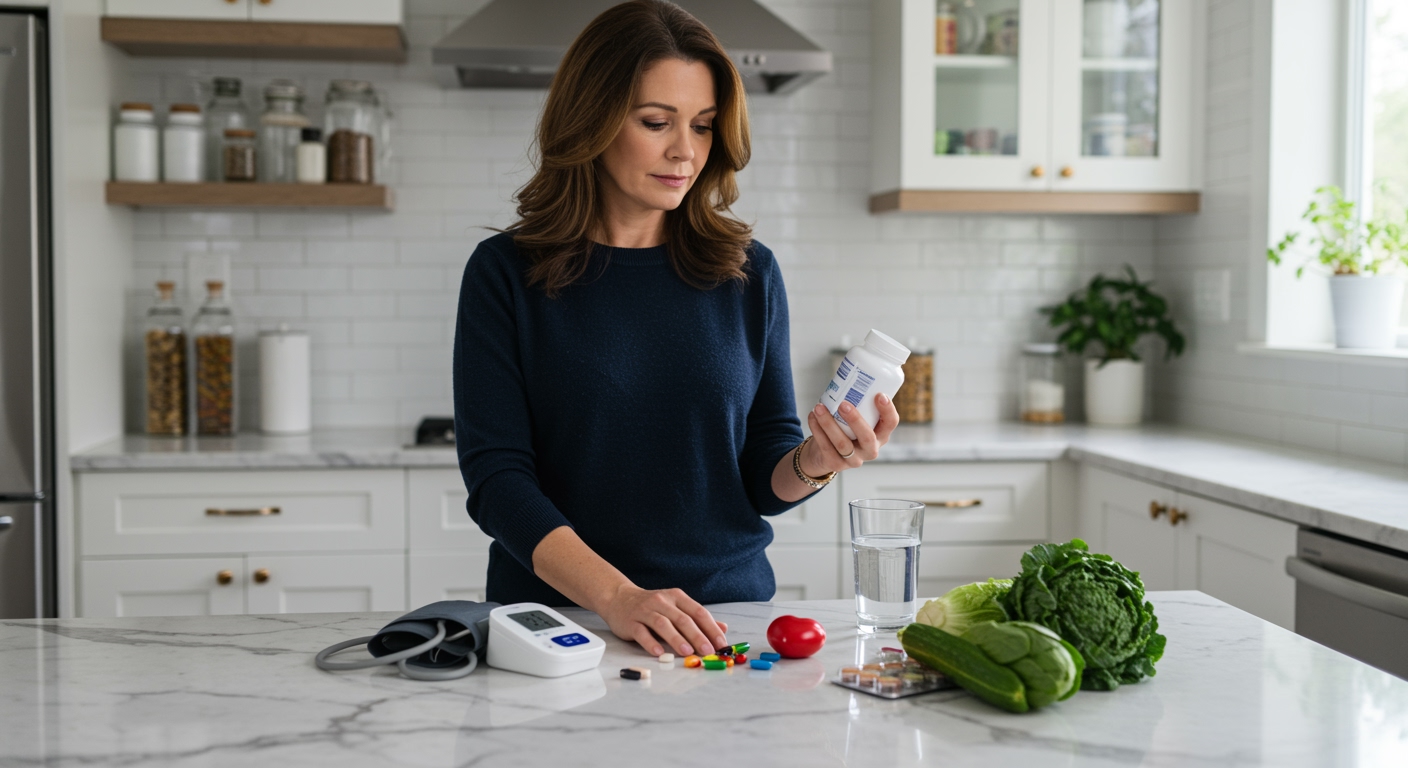✪ Key Takeaway: Multivitamins do not effectively treat low blood pressure and may contain ingredients that could worsen hypotension.
Introduction
You grab that bottle of multivitamins from your medicine cabinet, hoping it will fix your dizzy spells and low energy from hypotension.
Many people with low blood pressure turn to multivitamins because they believe these supplements will boost their energy and raise their blood pressure to normal levels.
Hi, I’m Abdur, your nutrition coach and today I’m going to explain why multivitamins are not the solution for low blood pressure and what actually works better.
Do Multivitamins Actually Raise Blood Pressure?
The short answer is no, multivitamins do not raise blood pressure in people with hypotension.
Most multivitamins contain a mix of vitamins and minerals that have either neutral effects on blood pressure or may actually lower it further.
For example, many multivitamins contain magnesium and potassium, which are known to help lower blood pressure by relaxing blood vessel walls.
Some multivitamins also include vitamin C and vitamin E, which act as antioxidants and may have mild blood pressure lowering effects through improved blood vessel function.
Research shows that people taking multivitamins do not experience significant increases in their blood pressure readings compared to those taking placebo pills.
Your body needs adequate blood volume and proper sodium balance to maintain healthy blood pressure, not just vitamins and minerals from supplements.
✪ Fact: Most multivitamins contain blood pressure lowering nutrients like magnesium and potassium.
Can Multivitamins Make Low Blood Pressure Worse?
Yes, certain ingredients in multivitamins can actually make your low blood pressure worse.
Many multivitamins contain high doses of B vitamins, particularly B6 and B12, which can cause blood vessel dilation when taken in excessive amounts.
This dilation means your blood vessels become wider, which can lower your blood pressure even further if you already have hypotension.
Some multivitamins also include herbal extracts like garlic or hawthorn, which are specifically used to lower blood pressure in people with hypertension.
The magnesium content in most multivitamins ranges from 100-400mg, which is enough to cause muscle relaxation in your blood vessel walls.
If you take your multivitamin on an empty stomach, the rapid absorption of these nutrients can cause a temporary drop in blood pressure that makes you feel dizzy or lightheaded.
✪ Pro Tip: Always take multivitamins with food to minimize sudden blood pressure drops.
What Nutrients Actually Help With Low Blood Pressure?
People with low blood pressure need specific nutrients that support blood volume and proper circulation, not generic multivitamins.
Sodium is the most important nutrient for raising blood pressure because it helps your body retain water and maintain adequate blood volume.
However, you will not find therapeutic amounts of sodium in any multivitamin because it would make the pills too large and salty.
Iron deficiency can contribute to low blood pressure, especially in women, because low iron reduces your blood’s ability to carry oxygen efficiently.
Vitamin B12 and folate deficiencies can also cause low blood pressure by affecting red blood cell production and overall blood volume.
The problem is that multivitamins contain small amounts of these nutrients mixed with many other vitamins that you might not need.
A targeted approach with specific supplements or dietary changes works much better than taking a multivitamin and hoping for results.
✪ Note: Sodium intake should be increased gradually under medical supervision for hypotension management.
What Works Better Than Multivitamins For Low Blood Pressure?
Instead of relying on multivitamins, focus on lifestyle changes that directly address the root causes of low blood pressure.
Increasing your water intake to 8-10 glasses per day helps maintain adequate blood volume, which is essential for normal blood pressure.
Adding more salt to your meals can help raise blood pressure naturally, but this should be done under medical guidance to avoid overcorrection.
Regular physical activity, especially strength training, helps improve circulation and can gradually raise blood pressure to healthier levels.
Eating smaller, more frequent meals prevents the post-meal blood pressure drops that many people with hypotension experience.
If you suspect nutrient deficiencies are contributing to your low blood pressure, get proper blood tests done to identify specific deficiencies.
Then work with your doctor to address those specific deficiencies with targeted supplements rather than taking a shotgun approach with multivitamins.
✪ Pro Tip: Blood tests can reveal specific nutrient deficiencies that contribute to your low blood pressure.
The Bottom Line
Multivitamins are not effective for treating low blood pressure and may actually contain ingredients that worsen hypotension.
The best medicine for low blood pressure is not found in a pill bottle but in your daily habits and food choices.
I would love to hear about your experience with low blood pressure management or any questions you have about nutrition and hypotension in the comments below.
References
At NutritionCrown, we use quality and credible sources to ensure our content is accurate and trustworthy. Below are the sources referenced in creating this article:
- PMC: Multivitamin and mineral supplementation and mortality
- Medical News Today: Supplements to lower blood pressure
- NIH Office of Dietary Supplements: Multivitamin/mineral Supplements
- Healthline: 13 Supplements to Lower Blood Pressure





